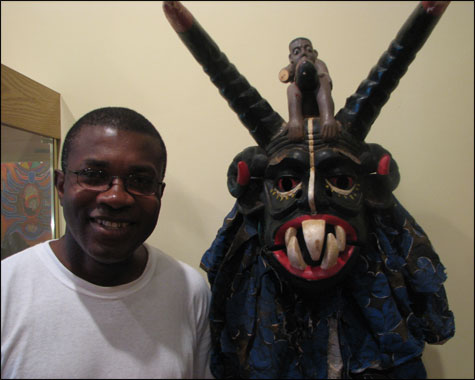An interview with Oscar Mokeme
By IAN PAIGE | July 31, 2008

MEDICINE MAN: Oscar Mokeme finds symbolism in African cultural artifacts. |
Oscar Mokeme is the Director of Portland Maine’s Museum of African Culture, which he co-founded in 1998 with Hannaford executive and collector Arthur Aleshire. It’s mission is to educate the community through the use of art and to celebrate diversity in the State of Maine.
The museum is celebrating its 10th anniversary in August. What are its origins?
The collection of this museum started much longer than ten years ago. The idea started in 1976 when i was in England. I am from Nigeria originally. When I was three months old, the World Health Organization was looking for the healthiest baby in West Africa through the School of Hygiene. Somehow, I passed the test and I was like the Gerber baby of West Africa so you’d see my face on baby products. That was through the Civil War into the 70s. Sixteen years later the WHO came back to follow up on this program. We were assigned an essay about preserving traditional culture. My essay was about preserving African Healing and the Arts, the medicinal use of herbs and traditional values. I got the first award and earned a grant to travel to Europe and visit museums.
I came from an old traditional family in Nigeria. We were a family of healers through many generations. In the European museums, I saw African Art, masks and ritual pieces, and it reminded me of my essay and taught me how to preserve it. I wanted to start a museum and a school of thought. When I went back I became obsessed with collecting. When a medicine man died, I would take over the shrine and make sure the items are cared for and not destroyed. Most of my teenage life was spent collecting, preserving and exploring the meaning of the art.
In 1979, I came to America as a student. I wasn’t allowed to get a job but started making money as a speaker in classrooms. I could see the questions from the children — there was some sort of spiritual bankruptcy in their lives, some sort of difference with a loss of cultural values. This became a sort of ministry for me — preaching about respect for your elders, understanding who you are, being connected.
Fundamentals to the culture in which you had grown up?
Yes, but trying to identify them in terms of American society. The art of Africa, the rituals and culture, were converted. They were considered primitive and pagan. But I found wisdom in them. Psychological motivations to the rituals was my interest — to pull them out and share them. When I came to Maine in 1988 I had a shop in the Old Port. With the advent of America On Line, I began making a name for the collection and received messages from all over. That’s how I met Mr. Aleshire, who is the cofounder. He provided the space in his Spring Street building and The Museum of African Tribal Art was born.
 Topics
Topics:
Museum And Gallery
, Cultural Institutions and Parks, Museums, World Health Organization, More  , Cultural Institutions and Parks, Museums, World Health Organization, Oscar Mokeme, MUSEUM OF AFRICAN CULTURE, Less
, Cultural Institutions and Parks, Museums, World Health Organization, Oscar Mokeme, MUSEUM OF AFRICAN CULTURE, Less 